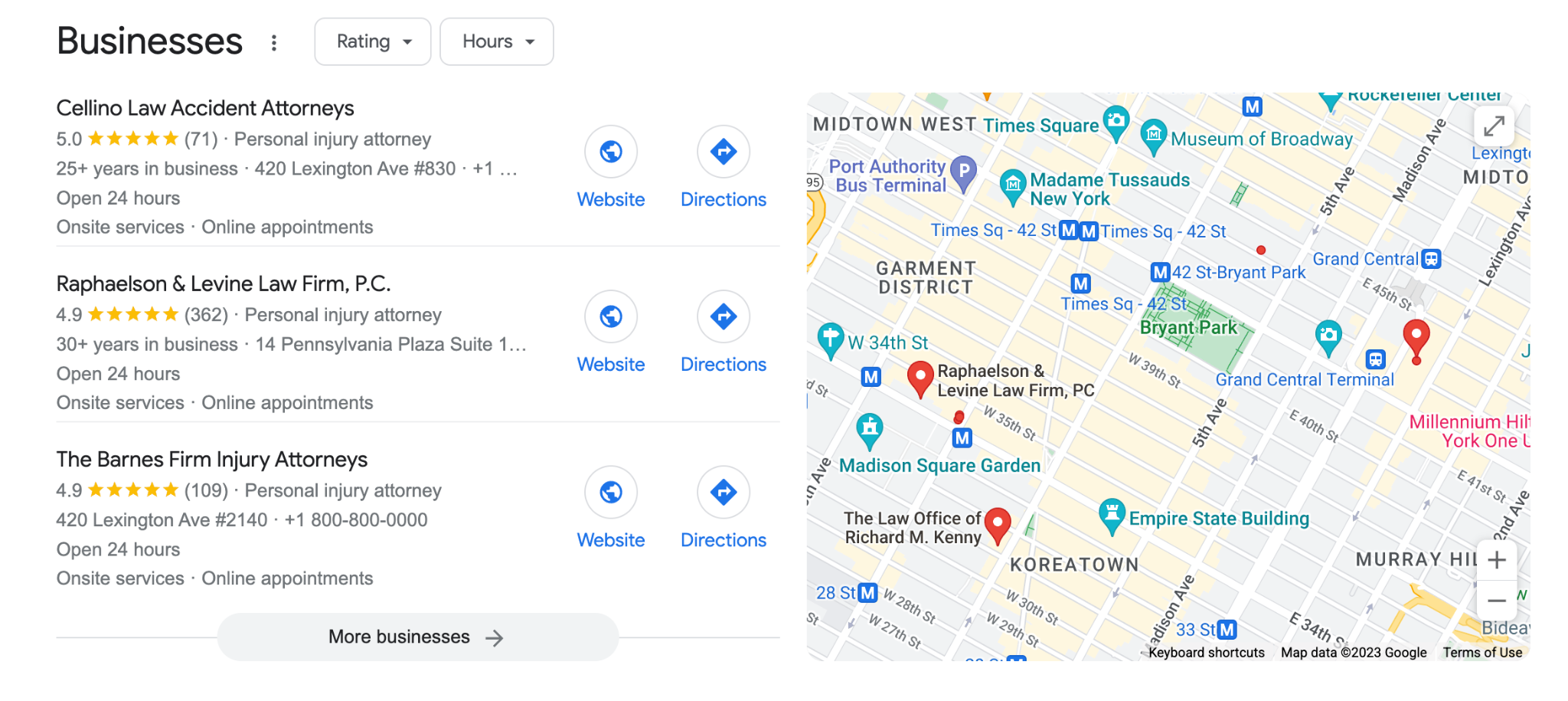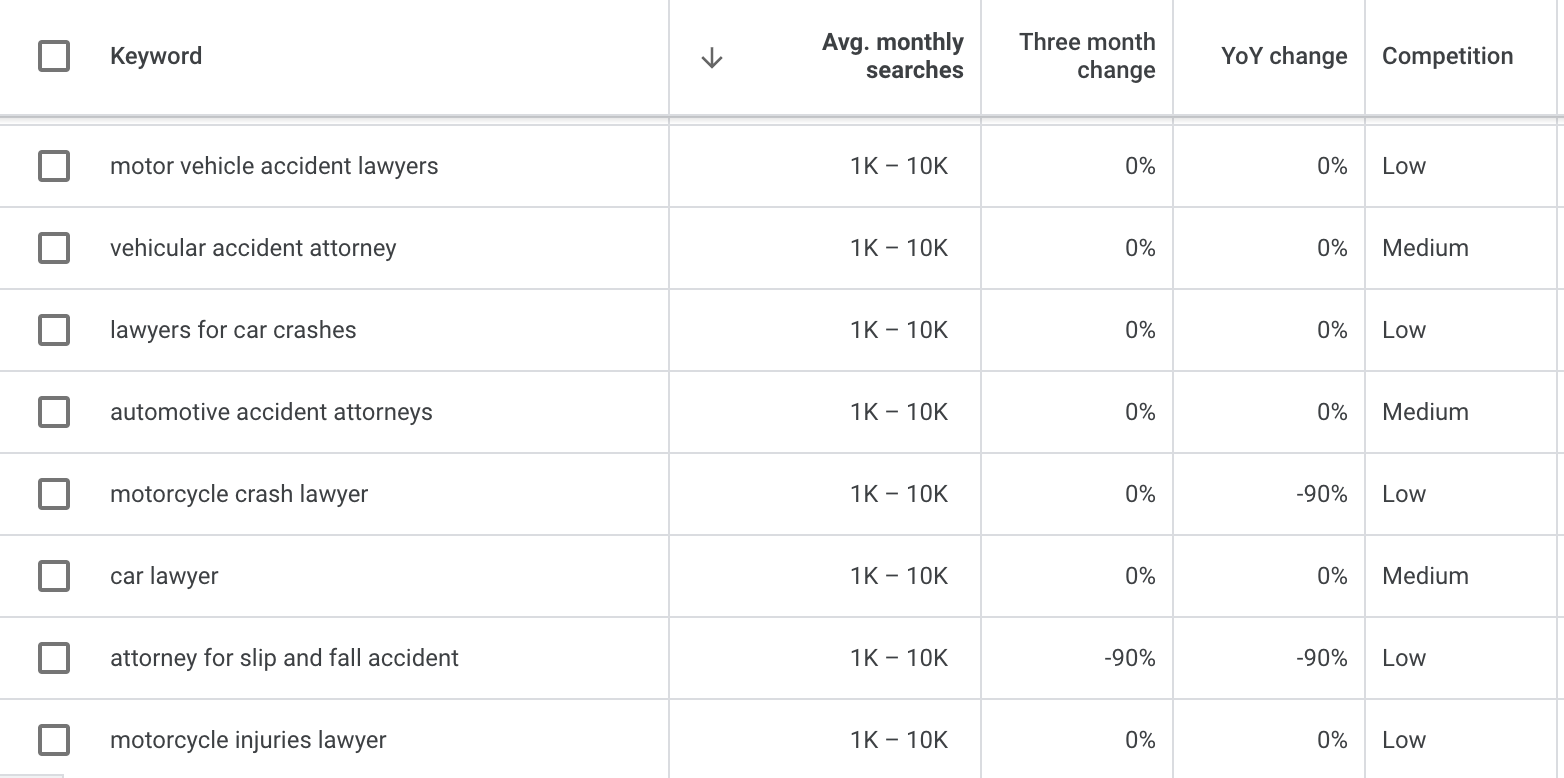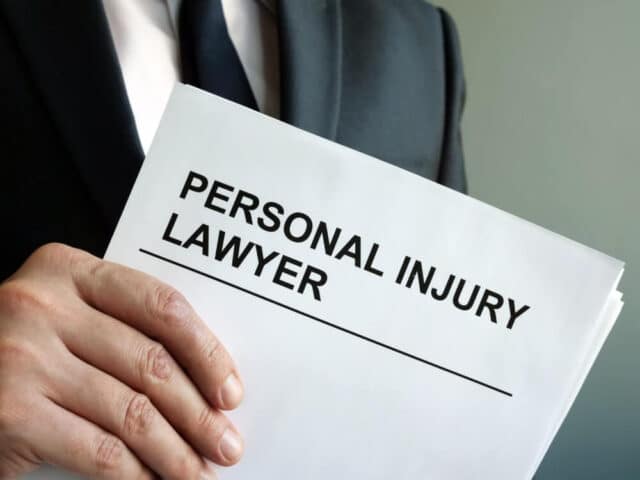50 Personal Injury Keywords for SEO and PPC
Knowing which personal injury keywords to use for your search engine optimization (SEO) campaigns is crucial to its success. Whether you use SEO or pay-per-click (PPC) methods to market your personal injury law firm, you need to be precise with your keyword choices.
In this article, we’ll help you learn more about why keywords are important and the top personal injury keywords that people search for online.
Suggested Reading: 19 Personal Injury Lawyer Marketing Ideas For 2025
Why Are Personal Injury Keywords Important?
Personal injury keywords are important because they help you reach your target audience by appearing on top of search engine results pages (SERPs). Optimizing your website for relevant and strategic personal injury keywords will play a huge role in getting more website visits, generating high-quality leads, and ultimately increasing your revenue.
To start implementing keywords, you’ll need to create a Lawyer SEO strategy that works for your firm. Hiring a law firm SEO agency is the most ideal approach as it ensures you the best results using proven methods.
Top 50 Personal Injury Keywords
To run a successful SEO campaign, you need to have a list of keywords that potential clients use when searching for personal injury law firms online.
You can use several keyword research tools like Ahrefs, Google Keyword Planner, and SEMRush to get detailed keyword data like search volume, competition, and keyword difficulty.
Below are 50 personal injury keywords that most searchers use when looking for services that involve personal injury claims.
| Rank | Keyword | Monthly searches | Keyword Difficulty | Estimated Traffic Potential |
|---|---|---|---|---|
| 1 | car accident lawyer | 76,000 | Medium | 92000 |
| 2 | personal injury attorney | 63,000 | Hard | 92000 |
| 3 | car accident attorney | 44,000 | Medium | 92000 |
| 4 | injury lawyer | 32,000 | Hard | 23000 |
| 5 | truck accident lawyer | 26,000 | Medium | 48000 |
| 6 | accident lawyer | 25,000 | Medium | 26000 |
| 7 | personal injury lawyers | 25,000 | Medium | 92000 |
| 8 | disability lawyer | 23,000 | Medium | 7800 |
| 9 | motorcycle accident lawyer | 23,000 | Medium | 48000 |
| 10 | medical malpractice lawyer | 22,000 | Medium | 88000 |
| 11 | injury attorney | 21,000 | Medium | 2400 |
| 12 | accident attorney | 19,000 | Medium | 26000 |
| 13 | personal injury lawyer near me | 19,000 | Medium | 18000 |
| 14 | car accident lawyers | 18,000 | Medium | 92000 |
| 15 | personal injury attorneys | 16,000 | Medium | 48000 |
| 16 | truck accident attorney | 15,000 | Hard | 7700 |
| 17 | car accident lawyer near me | 15,000 | Medium | 5600 |
| 18 | motorcycle accident attorney | 14,000 | Medium | 88000 |
| 19 | medical malpractice attorney | 14,000 | Medium | 92000 |
| 20 | auto accident lawyer | 13,000 | Medium | 9200 |
| 21 | auto accident attorney | 11,000 | Medium | 5800 |
| 22 | personal injury attorney near me | 11,000 | Medium | 19000 |
| 23 | car accident attorneys | 10,000 | Medium | 46000 |
| 24 | bicycle accident lawyer | 8,700 | Medium | 10000 |
| 25 | wrongful death attorney | 8500 | Easy | 3000 |
| 26 | accident lawyers | 6800 | Medium | 1600 |
| 27 | car accident attorney near me | 6500 | Medium | 9500 |
| 28 | dog bite attorney | 6400 | Easy | 7200 |
| 29 | insurance claim | 6200 | Hard | 4800 |
| 30 | construction accident lawyer | 5500 | Medium | 48000 |
| 31 | slip and fall lawyers | 5500 | Easy | 8600 |
| 32 | accident lawyers near me | 4100 | Medium | 22000 |
| 33 | auto accident lawyers | 4,100 | Medium | 1200 |
| 34 | malpractice attorney | 4,000 | Medium | 5600 |
| 35 | best personal injury lawyer | 3800 | Medium | 19000 |
| 36 | truck accident | 3700 | Medium | 92000 |
| 37 | insurance lawyer | 3600 | Medium | 26000 |
| 38 | best personal injury attorney | 3200 | Medium | 92000 |
| 39 | car accident lawyers near me | 3,200 | Easy | 30 |
| 40 | car crash lawyer | 3,000 | Medium | 92000 |
| 41 | workers comp attorney | 2,900 | Medium | 20000 |
| 42 | auto accident | 2,900 | Hard | 1500 |
| 43 | construction accident attorney | 2,600 | Easy | 20000 |
| 44 | auto accident lawyer near me | 2,400 | Medium | 92000 |
| 45 | bus accident lawyer | 2,300 | Easy | 85000 |
| 46 | car accident law firm | 2,200 | Medium | 21000 |
| 47 | best auto accident lawyer | 2,100 | Medium | 5500 |
| 48 | premises liability attorney | 1,900 | Easy | 100000 |
| 49 | accident injury lawyers | 1,600 | Medium | 6100 |
| 50 | work injury attorney | 1,500 | Medium | 1800 |
How Can You Conduct Keyword Research for Your Personal Injury Firm?
Before conducting keyword research, you’ll need to understand a few terms that you’ll come across during this process:
- Search volume – The number of people searching for a keyword in a given period (usually in a month)
- Competition – Usually classified as Low, Medium, or High, this refers to the number of competitors using a keyword to rank on SERPs
- Keyword difficulty – The level of difficulty to rank for a specific keyword
- Long tail keyword – Specific keywords (usually three words or more), that add a descriptive element (For example, “Miami personal injury lawyer”)
- Buying intent – These are phrases found within a keyword that indicates a person’s intent to buy (For example: “personal injury lawyer pricing”)
- Cost-per-click (CPC) – is the amount that an advertiser pays when someone clicks on their ad
Understanding these terms can help you with the process of identifying relevant keywords for your personal injury firm.
Personal Injury Keyword Research Tips
Finding the right keywords that attract potential clients can be overwhelming. Here’s a simple guide to help you get started:
Use a Keyword Research Tool
You won’t know which keywords will work unless you have the data to work on. This is why using a keyword research tool like Ahrefs is a crucial step in this process.

The screenshot above shows Ahref’s Keyword Explorer used to study the keywords “los angeles law firm”. Here, you’ll get useful, actionable information about this keyword including keyword difficulty, volume, related keywords, and CPC.
Conduct Competitor Analysis
Another approach to finding out keywords for your practice area is to spy on your competitors. A free tool like Moz’s SEO Competitive Analysis Tool allows you to enter any website to get information like domain authority, top keywords and pages, and top competitors.

Using this information, you can target the same keywords and create better content for them. In the example above, we learn that this website’s top keyword is “medical malpractice lawyers.” As an action plan, your firm can include this keyword in your list and create a blog post or a dedicated landing page specifically targeting this keyword.
Leverage Your Customer Data
If you don’t have the resources to use keyword research tools just yet, you can look into your customer data. Look at what your previous clients’ most common pain points were. What questions did they have when they approached your firm? From this, you can identify possible keywords and add them to your list of personal injury keywords to use for your SEO strategy, including Google Ads.
How to Integrate Personal Injury Keywords in Your Marketing Campaigns
Once you have a list of personal injury keywords, you’ll need to use them in your overall digital marketing campaign, including content marketing and paid ads (like Google Ads). It’s also best practice to implement all keywords to your law firm’s website.
Integrate Them Strategically in Your Injury Website to Help Its SEO
Your law firm website is possibly the first point of contact for people searching for personal injury law firms online. Using the right keywords on your website’s content is one of the most basic SEO strategies to increase your site’s visibility in search engine results pages (SERPs).
Your personal injury keywords should appear on the following elements on your site:
- Page Titles/Blog Post Titles
- Website URL
- Blog posts
- Headings/Subheadings
- Image and video alt-text (Alt-text is the text that appears in case an image or video does not load)
- Meta descriptions (A page summary visible on search engine results)
The best personal injury websites succeed because of optimizing their pages with relevant keywords, so it’s a proven strategy that works.
Filter Keywords With Buying Intent for Your PPC Campaign
If you’re planning on running paid advertising like pay-per-click (PPC), you need to use keywords with buying intent in your campaign.
Buying intent are words that indicate that a person is ready to buy a product or pay for a service. For law firms, these might include phrases like “pricing,” “payment plan,” and “consultation.”
Targeting and bidding on keywords with high buying intent will most likely bring you leads that are most likely to convert, giving your Personal Injury Law PPC campaigns the best chance of success.
Use Location-Specific Keywords
Another strategy to boost your SEO efforts is to use location-specific keywords. Local SEO works great with personal injury law firms because it helps your business appear in location-based search queries.
Keywords like “New York personal injury lawyer” help target potential clients in that specific location.
You can use location-specific keywords to rank on the local 3-pack, which is the top 3 spots that appear in Google search when a person uses a geographical location in a search term.
Below is the local 3-pack for the search term “personal injury lawyer new york”.

Creating an optimized Google Business Profile also helps with this strategy.
Target Relevant Keywords With Low or Medium Competition
Highly competitive keywords might not be worth the effort to bid on your PPC campaigns as they have high CPC. A better approach would be to look for keywords with low to medium competition but with a fairly decent search volume.
Below is an example of a keyword list using Google’s Keyword Planner. Using the keyword personal injury lawyer New York, we filtered the list to show only low to medium competition keywords with at least 1,000 searches per month.

These keywords are easier to target and rank for, but you should also choose those that are relevant to your law firm services.
Avoid Keyword Cannibalization
Keyword cannibalization happens when two related pages on a website compete with each other for ranking in Google. This usually takes place when there are two separate pages with similar keywords.
For example, “motorcycle accident lawyer” is similar to “bike crash lawyer”. As a best practice, you should only create one page for both of these keywords so the pages don’t cannibalize each other.
Most SEO specialists avoid keyword cannibalization by organizing content into hubs, or using a content pillar strategy, wherein you create several main topics or “pillar content” and publish several subtopics under each one.
Create High-Quality Content for Every Keyword
Keywords only help people find your business, but quality content can make them convert from website visitors to paying clients. When you create content that is tailored to your audience’s pain points, questions, and all legal concerns, you’re ensuring that your keyword strategy achieves the ultimate goal: turning visits into conversions.
Creating the best content for your law firm website or blog goes hand-in-hand with great keyword research. Make sure that your content delivers the following:
- Establish authority – Your content should convince readers why your firm is the best in the industry
- Build trust – By giving informative, actionable content, you show prospects that you are sincere in helping people with their personal injury concerns
- Nurture client relationship – Maintain a lasting connection even with past clients with the content that you continue to create
Lastly, people appreciate insightful content that helps them with a simple question, which can spell the difference between them choosing your firm over the competition.
Hire Personal Injury SEO Experts
While SEO is a skill that can be learned, it’s best to leave it to the experts. Hiring On The Map’s personal injury SEO experts can help you save time and achieve great results.
We specialize in personal injury (It’s our sweet spot) and our lawyer SEO team loves to rank for competitive injury keywords and run highly profitable personal injury PPC campaigns. Contact us today to get started.
Table of Contents
Related Articles
Dominate Your Market with Digital Marketing Services That Deliver
Talk to a certified professional today, and we will design a strategy specific to your case.






